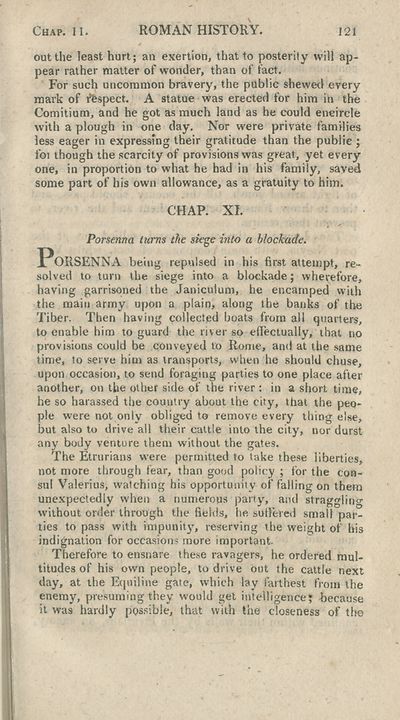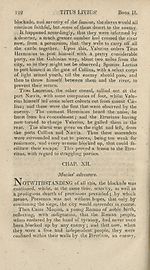Download files
Complete book:
Individual page:
Thumbnail gallery: Grid view | List view

Chap. 11.
ROMAN HISTORY.
121
out the least hurt; an exertion, that to posterity will ap¬
pear rather matter of wonder, than of fact.
For such uncommon bravery, the public shewed every
mark of Aspect. A statue was erected for him in the
Comitium, and he got as much land as he could encircle
with a plough in one day. Nor were private families
less eager in expressing their gratitude than the public ;
foi though the scarcity of provisions was great, yet every
one, in proportion to what he had in his family, saved
some part of his own allowance, as a gratuity to him.
CHAP. XL
Porsenna turns the siege into a blockade.
PoRSENNA being repulsed in his first attempt, re¬
solved to turn the siege into a blockade; wherefore,
having garrisoned the Janiculum, he encamped with
the main army upon a plain, along the batiks of the
Tiber. Then having collected boats from all quarters,
to enable him to guard the river so effectually, that no
provisions could be conveyed to Rome, and at the same
time, to serve him as transports, when he should chuse,
upon occasion, to send foraging parties to one place after
another, on the other side of the river : in a short time,
he so harassed the country about the city, that the peo¬
ple were not only obliged to remove every thing else,
but also to drive all their cattle into the city, nor durst
any body venture them without the gates.
The Etrurians were permitted to take these liberties,
not more through fear, than good policy ; for the con¬
sul Valerius, watching his opportunity of falling on them
unexpectedly when a numerous party, and straggiino-
without order through the fields, he suffered small par¬
ties to pass with impunity, reserving the weight of his
indignation for occasions more important.
Therefore to ensnare these ravagers, he ordered mul¬
titudes of his own people, to drive but the cattle next
day, at the Equiline gate, which lay farthest from the
enemy, presuming they would get intelligence? -because
it was hardly possible, that with the closeness of the
ROMAN HISTORY.
121
out the least hurt; an exertion, that to posterity will ap¬
pear rather matter of wonder, than of fact.
For such uncommon bravery, the public shewed every
mark of Aspect. A statue was erected for him in the
Comitium, and he got as much land as he could encircle
with a plough in one day. Nor were private families
less eager in expressing their gratitude than the public ;
foi though the scarcity of provisions was great, yet every
one, in proportion to what he had in his family, saved
some part of his own allowance, as a gratuity to him.
CHAP. XL
Porsenna turns the siege into a blockade.
PoRSENNA being repulsed in his first attempt, re¬
solved to turn the siege into a blockade; wherefore,
having garrisoned the Janiculum, he encamped with
the main army upon a plain, along the batiks of the
Tiber. Then having collected boats from all quarters,
to enable him to guard the river so effectually, that no
provisions could be conveyed to Rome, and at the same
time, to serve him as transports, when he should chuse,
upon occasion, to send foraging parties to one place after
another, on the other side of the river : in a short time,
he so harassed the country about the city, that the peo¬
ple were not only obliged to remove every thing else,
but also to drive all their cattle into the city, nor durst
any body venture them without the gates.
The Etrurians were permitted to take these liberties,
not more through fear, than good policy ; for the con¬
sul Valerius, watching his opportunity of falling on them
unexpectedly when a numerous party, and straggiino-
without order through the fields, he suffered small par¬
ties to pass with impunity, reserving the weight of his
indignation for occasions more important.
Therefore to ensnare these ravagers, he ordered mul¬
titudes of his own people, to drive but the cattle next
day, at the Equiline gate, which lay farthest from the
enemy, presuming they would get intelligence? -because
it was hardly possible, that with the closeness of the
Set display mode to:
![]() Universal Viewer |
Universal Viewer | ![]() Mirador |
Large image | Transcription
Mirador |
Large image | Transcription
| Antiquarian books of Scotland > Curiosities & wonders > Titus Livius' Roman history > (125) |
|---|
| Permanent URL | https://digital.nls.uk/115984649 |
|---|
| Description | Thousands of printed books from the Antiquarian Books of Scotland collection which dates from 1641 to the 1980s. The collection consists of 14,800 books which were published in Scotland or have a Scottish connection, e.g. through the author, printer or owner. Subjects covered include sport, education, diseases, adventure, occupations, Jacobites, politics and religion. Among the 29 languages represented are English, Gaelic, Italian, French, Russian and Swedish. |
|---|

